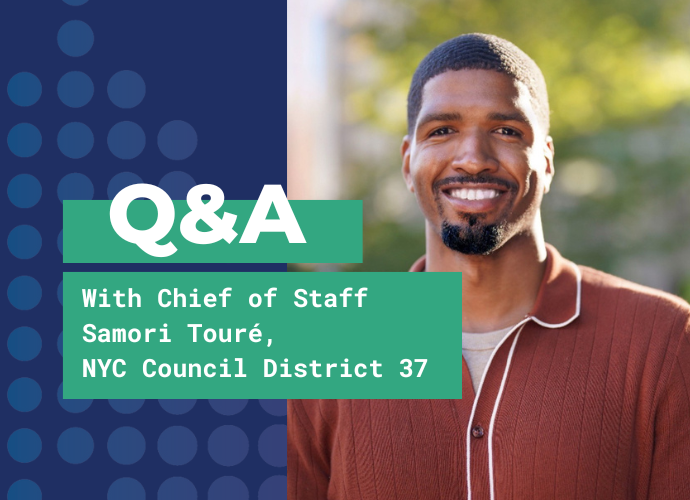BLOG
Institute Intelligence
Insights, case studies, news, and updates from ISLG’s good governance research and action.
Amid an uncertain economy, human services lead job growth—but wages threaten the sector’s long-term strength. Data shows us the way forward.
Summer job reports show that human services and state and local government are among the fastest-hiring sectors. But many of these jobs lag behind in wage growth. Our analysis of New York State charts a path for policymakers and other leaders to create a pipeline of quality, sustainable public services.
“We are the ones that keep things on the radar.” Q&A with NYC Council Chief of Staff Samori Touré
“The folks behind the scenes are the majority of the people working in city politics. There's only 51 council members in New York City, but each council member has a team of 7 to 10 people. So now we're talking about hundreds of people that are advocating for constituents. It's an army of people who care.”
Longtime Criminal Justice Leader Jeremy Travis joins CUNY ISLG as Senior Fellow
Travis brings an unmatched breadth of experience in criminal justice policy, research, and reform, and in leadership roles across government, academia, philanthropy, and nonprofit organizations.
Meet CUNY ISLG’s 2025 Public Policy Pathways Interns
The cohort of CUNY ISLG interns will work hands-on with the research, policy, data science, legal, and operations teams, as well as participate in discussions with subject matter experts across a number of pressing issue areas.
Celebrating a Year of Community-Based Restorative Justice in NYC
A year after launch, ISLG convened the 16 Community-Based Restorative Justice initiative grantees to celebrate the work being done on the ground, as well as the training and technical assistance experts who’ve provided support along the way and the funders who can keep the work going.
Rethinking RFPs and Grant Management for Real Impact
The Request-for-Proposal (RFP) and other parts of grantmaking often leave out smaller, grassroots community organizations who are closest to those they serve. Using our Community-Based Restorative Justice Program and Grassroots Policy Incubator as examples, we dig into ways that funders and grant managers can create a more inclusive process that uplifts new ideas without sacrificing program quality and accountability.
10 Years into the Safety and Justice Challenge, Data Continues to Show No Link between Jail Population Reductions and Violent Crime
For the fourth year in a row, an analysis of individual-level jail data and county-level crime trends assessing the relationship between pretrial release and crime affirms past findings: violent crime and the rate that people returned to jail after release have remained the same before and after reforms were implemented.
“You’re a visionary for your district.” Q&A with New York State Assembly Chief of Staff Anna Myers
“My goal is to ensure everything is moving—and if there are roadblocks, I spot it long before anybody else in the team, so that I can rearrange things and clear them. My role is to be strategic, a problem solver, and a project manager all at once.”
“They're the spine of the office.” A Q&A with NYC City Council Deputy Chief of Staff Brandon Jordan
“Staff in legislative offices are there to give their constituents support, especially when the world seems on fire. These are the people that have a hose to help put out those fires—sometimes, they may be the smallest of fires, but they're putting out a fire.”
Measuring Progress: New Insights on Bookings, Returns to Jail from SJC Communities
Building on past work, Measuring Progress has expanded to include a new set of insights, highlighting the impact of SJC strategies on the individuals cycling through the jail system, what charges they are coming in on, how long they are staying, and whether they are returning to custody.
Women in Jails: What the Numbers Show, and Don’t Show
Factors leading to rising rates of incarcerated women are not well-understood or researched. Recognizing the differences in pathways that lead women and survivors of violence to jail are crucial to developing more gender-responsive, equitable, and effective criminal justice policies focused on reducing jail populations.
Protecting Globally Recognized Human Rights at the Local Level
December 10th is Human Rights Day. We’re spotlighting a few approaches that state and local governments can take to protect globally recognized human rights at the local level.












